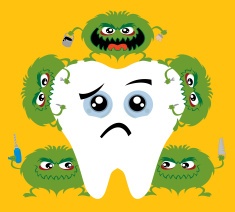There are several things you can do to prevent tooth decay
Brush and floss daily– By brushing and flossing twice a day, you are helping to remove the build-up of plaque (the invisible, sticky film over your teeth) which contains the bacteria that attacks your tooth enamel and causes cavities. Brushing alone is not enough – you must floss between your teeth to remove the hidden plaque and bacteria, and this also helps to keep your gum line clean too. If your teeth bleed when you floss, ask your dentist for tips on improving your flossing technique.
Visit your every six months for a scale and polish appointment– Over time, the plaque on your teeth that can’t be removed by brushing or flossing alone hardens into tartar, which needs to be removed by your dentist with a thorough cleaning. Our general dentist uses ultrasonic instruments to tailor the cleaning to your comfort level and sensitivity, or if you have very sensitive teeth we can use hand instruments for effective plaque removal.
Monitor your sugar intake– High-sugar diets lead to all sorts of health problems, but they are particularly harsh on your teeth as the bacteria in your mouth utilises the sugar from foods and drinks to produce acids which attack your tooth enamel and cause decay and cavities. We know it is next to impossible to avoid all sugar, but, by reducing your intake of fizzy sugary soft drinks, cutting back on sweets and being aware of the hidden sugar content of the foods and drinks you consume, you can help to prevent decay.
Speak to your dentist about any medications you might be taking- Occasionally, certain medications can accelerate the decay process, so, although your diet might be healthy and low in sugar, you may still develop cavities. Medications such as high blood pressure treatment, antacids or antihistamines can lead to oral health complications. If you are concerned about the impact these could have on your teeth, talk to us about a comprehensive treatment plan for looking after your whole mouth.
Book online with us here
What is tooth decay?
| Tooth decay is caused by the loss of minerals like calcium and phosphate from your tooth surface (also referred to as “demineralisation”).
Demineralisation is a result of acids produced by the bacteria on tooth surfaces attacking your tooth enamel. Cavities are caused by prolonged demineralisation. An early sign of demineralisation may appear as a white spot on the tooth. At this stage, lost minerals may be replaced with the help of fluoride. If minerals continue to be lost, a hole (cavity) forms in the tooth and a filling is required to repair the damage. Tooth decay occurs on the chewing surfaces, the surfaces between the teeth and around fillings. When gums recede decay can also occur on the root surfaces of teeth. |

Tooth Decay Prevention
- Remove plaque thoroughly from all tooth surfaces by daily toothbrushing and flossing/interdental brushing.
- Use a toothpaste with appropriate level of fluoride, twice daily.
- Use a soft or medium toothbrush. Brush in a set pattern, making sure that you don’t miss any teeth. Ask our hygienist for a lesson on how this should be done.
- Use floss or interdental brushes to clean between the teeth, where cavities can often develop.
- Reduce your sugar intake – especially between meals
- If you suffer from a dry mouth, possibly due to medication, talk to us about appropriate care.
- Have regular dental check-ups to make sure that your dental hygiene is up to scratch.
For more information on tooth decay and how you can prevent it;
Contact us on
Phone: 01-5378045
Lo-Call: 1890223344
Email: hello@dentalhouse.ie

Leave A Comment